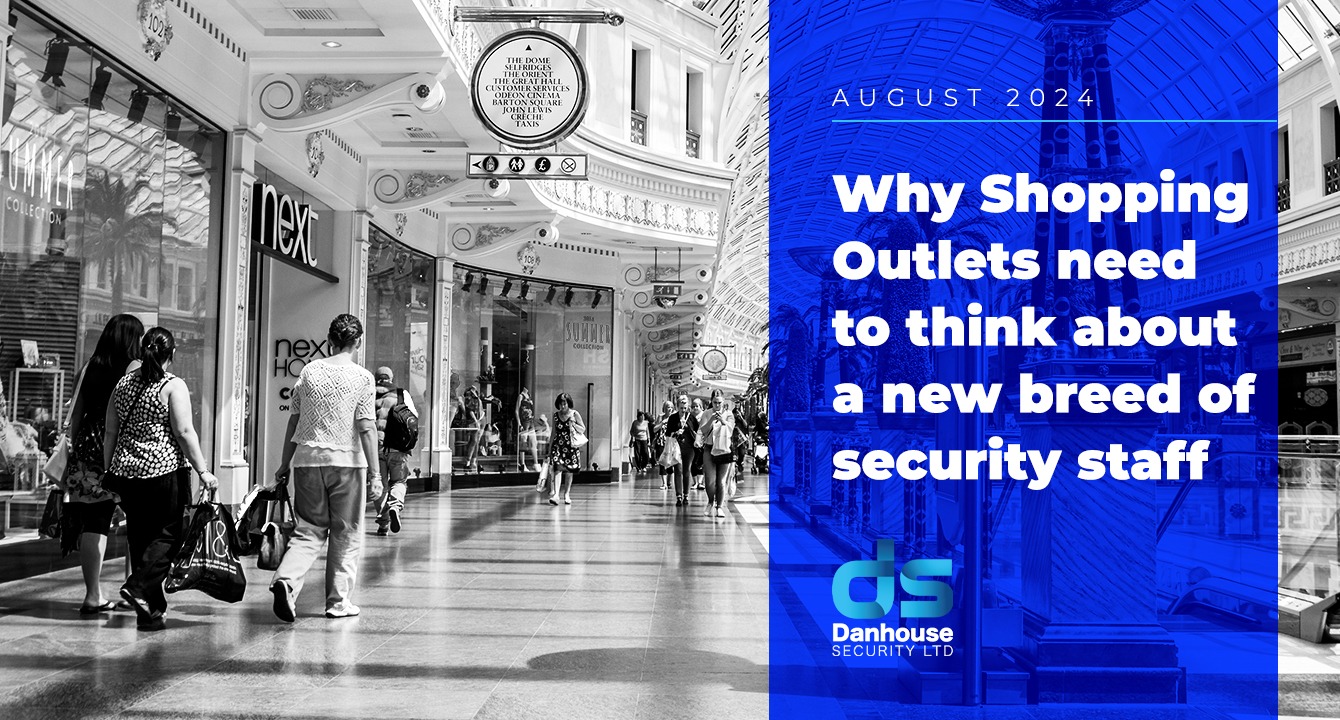Shopping for a new breed of Security
John Fitzpatrick, Danhouse Managing Director
In 2023, shopper’s footfall rose by 3% despite the cost of living crisis. As purses are being squeezed, shopping centres are attracting more customers by creating more luxurious, lively, and entertaining spaces which encourage spending. At the same time, shoplifting also reached its highest level in two decades across England and Wales, according to the Office of National Statistics (ONS). The challenges faced by today’s shopping outlets require a new breed of security officer, one who not only deters criminals but also welcomes shoppers and encourages their return.
The retail sector contributes approximately 5% to the UK economy and employs around three million people, according to the BRC (British Retail Consortium). After the pandemic, restrictions were lifted, and in-store shopping naturally increased as life started returning to normal. To attract more footfall, around 30% of a shopping centre’s leasable area hosts pop-up stores, farmer’s markets, art exhibits, cooking demonstrations or wine tastings, according to Simplaq. Many centres have extended activity into the night with restaurants, cinemas and live entertainment. It means that the landscape for security has changed, and security companies and their officers have had to change with it. Security personnel need to stay alert and welcoming in an increasingly dynamic shopping environment.
Changing the approach
At its most fundamental, the primary role of a security team is to protect consumers and retail businesses. Their presence acts as a reassurance to visitors and a deterrent to potential thieves and vandals; they can also identify hazards or threats and are trained to de-escalate tense situations.
Security personnel have become part of the front-of-house team acting as brand ambassadors for the shopping centres. The role is about strong and effective customer service to drive consumer satisfaction and loyalty. With the staggering number of visitors that security officers interact with, effective communication is key to helping shoppers to feel safe and comfortable. Ensuring the shopping environment is protected whilst offering a welcoming, friendly, and helpful presence helps public confidence. Making every customer feel welcome requires all the skills of a concierge, which officers must have to ensure shoppers return. Gone are the stereotypical, domineering security ‘guard’; today they need to be friendly and approachable. Often wearing coloured blazers to be easily identified by customers, they are a reassuring presence in a shopping mall and a beacon of help.
Safe and secure
Security officers in shopping centres still spend their time observing people and their behaviours. They have one eye on whether someone might pose a risk to security and another eye on whether they need help or whether they pose a risk to themselves or others.
Should trouble arise, all officers are extensively trained in de-escalation techniques, conflict resolution, and first aid. The training will also equip them to deal with various incidents involving the death or serious injury of a person on site, accidents, heart attacks, assaults, or a lost child, so they approach these situations confidently and help the vulnerable in the best way possible.
Many security firms like to use wearable technology (similar to the body cams used by police) so both the site and the actions of the people in an evolving situation can be recorded; it helps the police and protects the centre owners against potential liabilities. It also protects the individual. However, it brings its own complications. Customers who are told they are being recorded are inclined to suddenly change their whole demeanour and begin to back away rather than allowing officers to help them. There are also issues with GDPR. All in all, officers have to know when to turn the camera on and turn it off.
Security teams often need to liaise with security centres using surveillance systems to monitor and prevent trouble. Shop staff may come to the security officer for advice on how to deal with a situation. They provide a measured, on-the-ground response to a seen event or alarm and provide the appropriate front-line response, liaising closely with the retail store security and local police, helping to detain suspects, gather evidence and assist with the investigation process when appropriate. Equally, they can ensure staff follow security protocols such as not propping shopping centre doors open with a fire extinguisher, leaving doors unlocked or allowing unauthorised personnel into areas which are not public access.
At the heart of all these activities are strong communication and ‘softer’ people management skills.
Opening up opportunities
Having a multi-disciplined team is important, as is using their skills in the most appropriate manner. Officers who patrol perimeters at night may need a different set of skills than those with a customer-facing role during the day.
Today there is a tendency for security teams to be more diverse to better reflect the customers they serve; there are more opportunities for women for instance, and yet the industry still struggles to attract and retain recruits.
Historically, security officers were paid the minimum working wage, but now these front-of-house staff receive pay in line with hospitality workers. Shopping centre management and their partners are keen to pay officers at a rate that will help create team stability. A longer serving team, with low staff turnover, allows long term relationships to be built with other shopping centre staff, the security teams for the retailers, or indeed the local community.
Also, many security roles are still based on 12-hour shifts, but that too is changing. Danhouse Security Services believes the concentration needed in a busy and chaotic retail environment is intense, and to keep officers fresh they need to be working shorter shifts. These are not only better for delivering a more effective security service, but they are also more attractive to new recruits as it offers a better work-life balance, particularly for those with families and young children.
Often, security staff will take the role only to move on as quickly to ‘something better’ because they do not realise there are opportunities for training and career development in the industry. The industry needs to actively encourage its staff to study people management, account management or business management if they have the desire to progress and elevate their career from the front line to leadership levels. It acts as a long-term incentive for staff to stay with an individual business and the industry. Reducing staff turnover.
The more varied environment in today’s shopping centre has created a more varied security role than many people realise. Teams need, and learn a variety of skills including people management, conflict resolution, GDPR regulation, as well as health and safety or first aid. They have the practical role of observing and knowing how to act if an incident arises, but foremost they need to be a helping hand to customers. The modern security officer has better working conditions, a more varied role and with good mentoring, supervision, and training, is better able to deter criminals, to welcome and reassure shoppers and be an asset to the shopping centre brand.
This news article has already received some great coverage already in the below publication.









